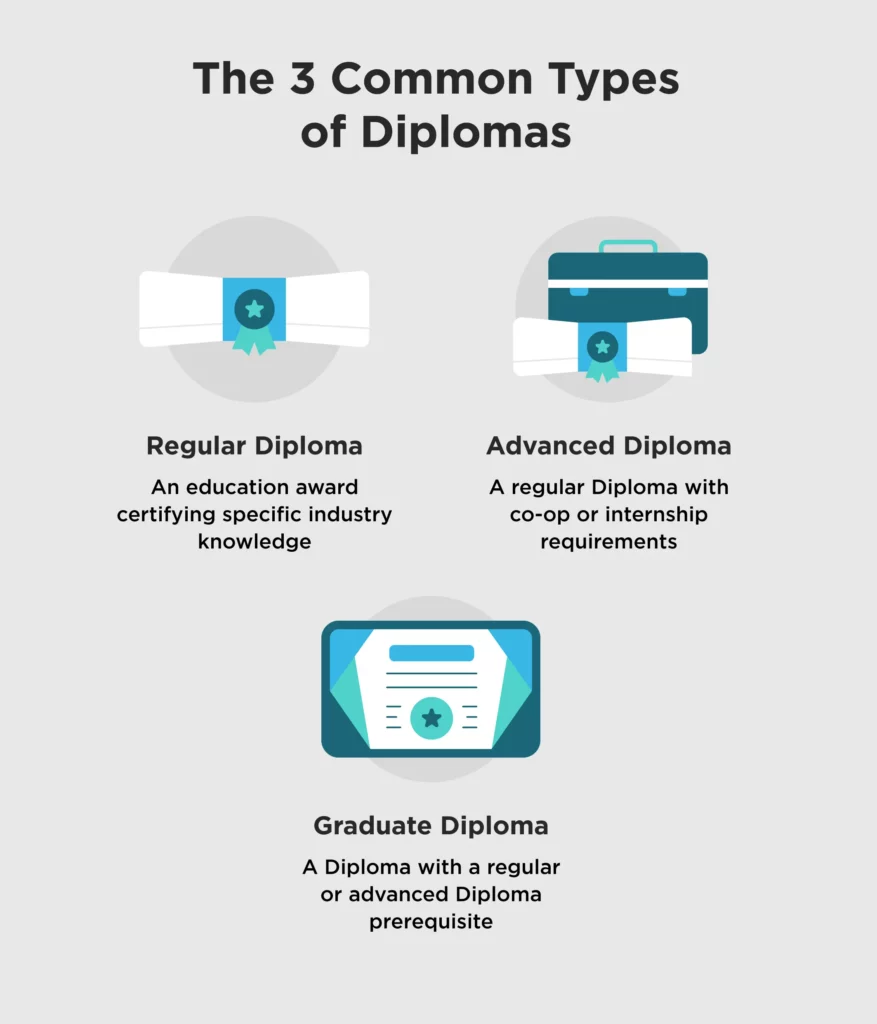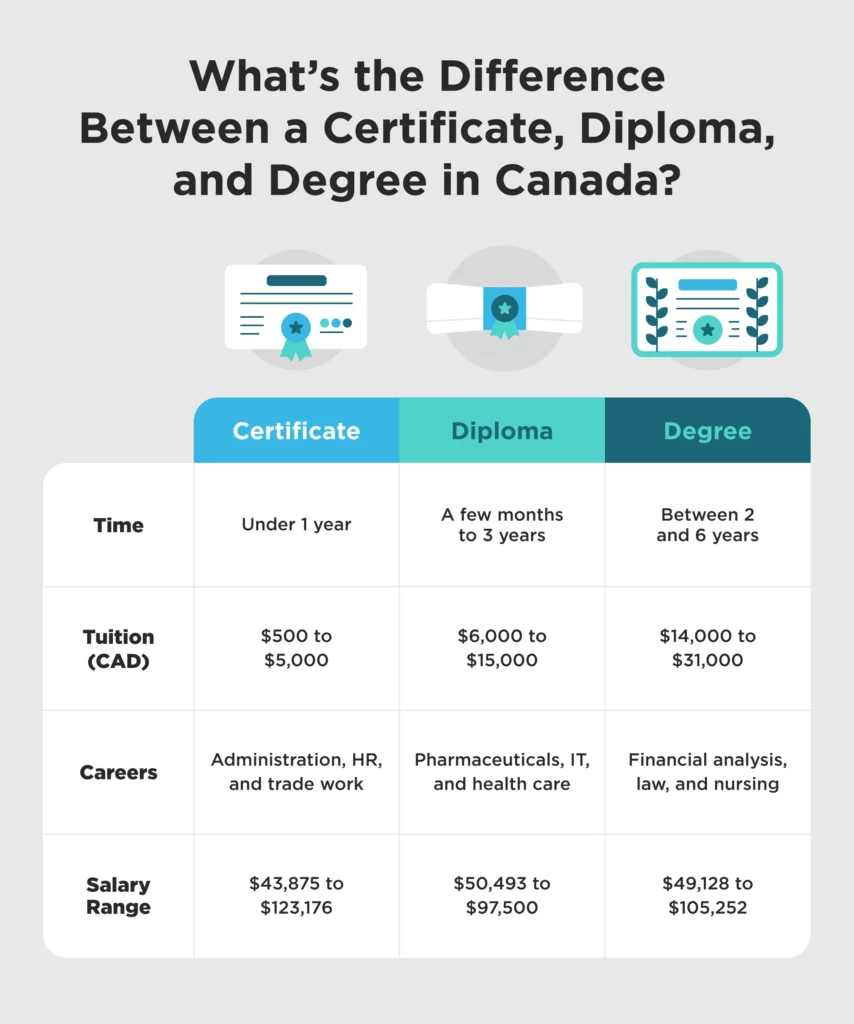
Diploma vs. Certificate vs. Degree: What’s the Difference?
Whether you’re a recent high school graduate or want to bring new skills to your current field, deciding to go to school is a big step. With more than 2.5 million students obtaining post-secondary education, it’s unsurprising that cost, career opportunities, and learning experiences are the driving decisions behind the programs they enroll in.
When you’re considering the differences between a Diploma vs. Certificate vs. Degree, it’s vital to understand where you want to study, the courses and hands-on experience you prefer, and the credentials you need in your chosen field.
This guide presents everything you need to know to determine the difference between a college Certificate, a Diploma program, and Degrees, including their course length, cost, career options, and training requirements.
What Is a Diploma?
A Diploma is an education award that signifies you’ve completed distinct education requirements in a specific field, including courses and hands-on experience. Diploma programs are often technical and give students practical skills they can apply directly in their chosen field.
In addition to a regular Diploma, there are two other Diplomas a student can earn:
- Advanced Diploma: A Diploma with co-op or internship requirements
- Graduate Diploma: A Diploma that can only be obtained after a student has completed a regular or advanced Diploma
Besides these post-secondary Diplomas, some colleges also offer Diploma courses to help adults pass the General Education Development test (GED). These special programs vary depending on the institution.

Pros and Cons of a Diploma
Diploma programs can be a cost-effective education option for various students, especially those looking to change careers or focus on specific skills. Diploma programs prepare students to successfully apply skills in their chosen field and reach specific career goals. However, Diploma programs require longer time commitments — from a few months to three years — than Certificate programs and are often more expensive.
Pros
Cons
- Multiple start dates each year
- More cost-effective than Degrees
- Fewer prerequisites than Degrees
- Relevant and useful courses
- Internship or practicum opportunities
- Networking opportunities
- Take longer than Certificates
- Less cost-effective than Certificates
What Is a Certificate?
A Certificate is a formal acknowledgment of an individual’s mastery and training in a specific area or of a specific skill associated with a job requirement. It signifies you have the proper hands-on training for a given position, which means you can apply as soon as you enter the field. Students can earn certificates through in-person instruction, online courses, or a hybrid of both.
Many jobs require specialized training and skill sets. Students who wish to enter and excel in various fields — including Human Resources, Graphic Design, Cybersecurity, Education, Food Services, Health Care, and more — may need to earn a Certificate before receiving promotions or increased responsibilities.
Pros and Cons of a Certificate
Compared to Diploma and Degree programs, Certificate programs are a less expensive education option. Application deadlines and program start dates don’t leave students waiting months or years, and programs and classes are tailored to specific areas of study and practical skills.
While this specificity is required for many professional positions, it can also limit a student’s ability to gain a well-rounded, balanced education by focusing on nontransferable field- or industry-specific skills like Medical Terminology and Sports Nutrition. But, Certificate programs are excellent for building extra skills both inside and outside the workplace.
Pros
Cons
- Multiple start dates and flexible learning hours
- More cost-effective than Diplomas and Degrees
- Concise time requirements
- Specific field-related training
- The application deadline and program start date are close together
- Specificity can affect the balance of a student’s education
- Multiple Certificates may be required for greater growth
What Is a Degree?
A Degree is a qualification awarded to a student who finishes an undergraduate or graduate program at an accredited college or university. There are various types of Degrees depending on the time the student spends earning qualifications, including:
- Associate Degree: An undergraduate Degree that focuses on transferable skills for specific disciplines and is obtainable within two years
- Bachelor’s Degree: An undergraduate Degree requiring twice as many credit hours (120) as an Associate Degree
- Master’s Degree: A graduate-level Degree providing specialized knowledge to students looking to advance their career
- Doctorate Degree: A postgraduate-level Degree often considered the highest Degree qualification in fields like education and business
Pros and Cons of a Degree
Of the three, Degrees are easily the most expensive and time-consuming education option. However, many fields require individuals to earn industry-specific Degrees before pursuing careers. Expansive education offerings and in-depth practicums and fieldwork can help set students up for future success.
Pros
Cons
- Multiple start dates and flexible learning hours
- Expansive education covering everything from general courses to industry-specific skills
- Field-related training
- Increased average salary ranges
- Longest course compared to Diplomas and Certificates
- Most expensive education option
- Can require significant prerequisites
Certificate vs. Diploma vs. Degree: Key Differences
There are differences to consider in the Certificate vs. Diploma vs. Degree debate, including time requirements, tuition costs, and a student’s future career options.
Time Commitments
The time commitments for Certificate, Diploma, and Degree programs depend on the field and the college you’re attending. The more in-depth a curriculum is, the longer completion will take. For example, Robertson’s Pharmacy Technician Diploma program requires around one year of classroom and practicum work, while a Project Management micro-course requires 60 hours of study.
On average, each will take:
- Certificate: Under a year
- Diploma: As little as a few months up to three years
- Degree: Between two and six years
Program Tuition
Budgeting for student life can be difficult when you don’t know what to expect when it comes to tuition. To help give you a better sense of potential post-secondary education costs, here are the typical tuition ranges associated with Certificates, Diplomas, and Degrees:
- Certificate: $500 to $5,000
- Diploma: $6,000 to $15,000
- Degree: $14,000 to $31,000
Career Options
Depending on your program’s length and industry experience requirements, there are a variety of career options available for students completing Certificate, Diploma, and Degree programs. Some of the most common fields for each program are listed below:
- Certificate: Administration, human resources, telecommunications, trade work and electricity, and web development
- Diploma: Pharmaceuticals, accounting, education, IT, hospitality, health care, and engineering
- Degree: Nursing, development, financial analysis, law, software engineering, and journalism
Which Is Better: A Certificate or Diploma Program?
Diploma and Certificate programs are similar in many ways, and there are advantages to both. Choosing one over the other depends on your individual needs and future goals. The beauty of education is you get to do what’s best for you.
To decide if a Diploma or Certificate program is the right fit for you, ask yourself:
- How much time do I want to invest in school? Certificate programs are generally shorter. If you’re ready to dive into the workforce, consider a shorter program.
- Why am I going to school? Do you want to learn a new skill or build on skills you already have? Diploma programs and practicum placements increase general hands-on skills and industry experience, while Certificate programs focus on skills for specific roles.
Before diving into post-secondary education in Canada, identify your needs, education goals, and career aspirations. You may even want to consider investing in a course about applying to college to better understand the commitments and expectations of Certificate and Diploma programs.

FAQ
Gain answers to common questions about the differences between Diplomas, Certificates, and Degrees below.
Is a Certificate Better Than a Diploma?
Whether or not a Certificate is better than a Diploma depends on your career goals. Certificates are usually shorter and more specialized, while Diplomas cover areas of general field knowledge, but each is necessary for certain industries.
Is It Worth It To Get a Certificate?
It can be worth it to get a Certificate. Many career-related changes like increased responsibility and professional trust, promotions, and salary increases can be directly linked to continued education.
What Is the Difference Between a Graduate Certificate and a Diploma in Canada?
The main difference between a graduate Certificate and a Diploma in Canada is the time requirement. A Certificate program usually takes less than one year to complete, while a Diploma can take anywhere from a few months to three years. Additional differences include cost, career opportunities, hands-on experience, and average salary after graduation.
How Long Does Earning a Certificate or Diploma Take?
On average, it takes under a year to earn a Certificate and anywhere from a few months to a few years to earn a Diploma.
Is a Graduate Diploma Higher Than a Graduate Certificate?
Yes, a graduate Diploma is higher than a graduate Certificate. A graduate Diploma usually builds on the courses and skills earned during a graduate Certificate program.
Invest in a Diploma or Certificate at Robertson College
Despite the Diploma vs. Certificate conversation, there’s a program meant for you. Whether you want to train for, advance, or change your career, there are plenty of opportunities at Robertson in one of our many Certificate and Diploma programs.
Our online courses give you the flexibility to work at your own pace, set your schedule, and study from the comfort of your home, and our six campuses across Western Canada offer in-person instruction for students in the School of Business, School of Technology, and School of Health.
Plus, our micro-courses are designed to help you level up your current skill set, learn something new, and develop career-specific skills.
Contact us today to jump-start your Diploma or Certificate program at Robertson.
Link nội dung: https://diendanxaydung.net.vn/diploma-certificate-degree-a65603.html
